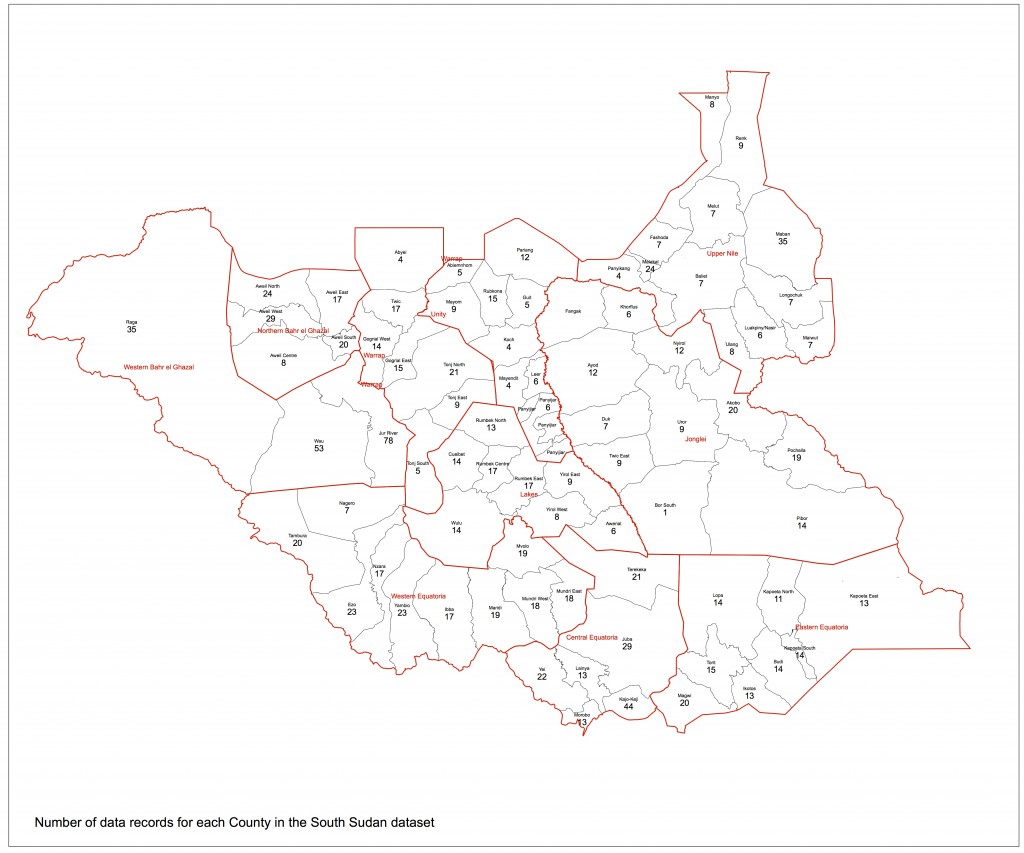On Monday, July 2nd, the Digital Humanitarian Network (DHNetwork) received a request for activation from UN OCHA’s Coordinated Assessment Support Section. OCHA is responsible for leading the development of some of the first information products when a crisis hits. These products define the initial situation at a multi-sectoral level helping guide the delivery of goods and services during the first weeks of an emergency. The deployment aimed to collect secondary data to include in the materials used in conducting these initial analyses for South Sudan. The data would be provided as a starting point for further data collection to an OCHA assessment team visiting South Sudan.
On Tuesday, July 3rd, the DHNetwork proposed that the SBTF be the Solution Team for this activation request. The SBTF was subsequently activated in partnership with OCHA. This was an interesting deployment for the SBTF, since it was essentially an exercise in crowdsourcing the curation of information - finding data online and providing it in a standard format to render it easily usable by OCHA. Volunteers were asked to search for data on population, displacement, returnees, refugees, security incidents, schools, water sources, health facilities and economic constraints - all aggregated at the county and state levels. The screenshot below (of OCHA’s online data repository) shows how little was available to the OCHA team prior to their field visit:

As requested by OCHA, the SBTF activated volunteers within 48 hours. A team of volunteers then worked for 3 days, trawling the internet for reports, articles and anything they could get their hands on, and collected a total of 1767 unique rows of data and 15,271 unique pieces of information records (see map below, generated by David Litke):
The morning after the volunteers finished, the OCHA team emailed us the following:
“It’s morning in Geneva (and Juba), and we just wanted to touch base with all of you out there working around the clock to collect all of this information for our team in South Sudan. We continue to be blown away by how much information you are gathering-and the detail of it!-and want to again extend our thanks and sincere appreciation for your hard work.”
Another OCHA colleague also wrote to indicate that this deployment was not only about delivering a product, but also about the future of Volunteer and Technical Communities (V&TCs) collaborations:
“The lessons learned from this deployment will go beyond the case of South Sudan and will benefit the entire humanitarian community, as it will help OCHA identify how partnering with SBTF can contribute to informing a more effective humanitarian response in the future.”
So with this in mind, what have we learned? Two key lessons stand out for us. First, it is clear to us that crowdsourcing curation of information can be very helpful to humanitarian preparedness and response. Specifically, the value added of crowdsourcing in this deployment was to have many creative minds looking for alternative sources of information that the OCHA team might not have thought of. A few hours before the end of the agreed deployment, volunteers received the UN Information Management Working Group Digital Atlas for South Sudan. This extensive UN dataset contained much of the information OCHA required for their field mission in South Sudan. The identifcation of this dataset late into the deployment made the volunteer team wonder why it had not been made available at the start of the deployment. Therefore, our first lesson learned is that it is crucial for any activator of an ‘information curation’ type deployment to perform an initial search of existing sources of information that exist within their organization in order to identify any gaps and outdated information for which they would need SBTF’s crowdsourcing capabilities. This would ensure that volunteers are building on previous efforts rather than duplicating them and provides more value to our volunteers’ work and the overall objective of the deployment.
Second, the lead time for non-emergency deployments should be at least two weeks. The SBTF and other V&TCs are very keen to support preparedness activities by humanitarian actors. However, volunteers can’t be expected to mobilize quickly and drop other commitments for a non-emergency deployment. It is unnecessary, and may burn out volunteer goodwill for actual emergency situations. It is also worth noting that this activation occurred during July 4th (major public holiday in the US).
The volunteers involved enjoyed working with the OCHA team, and appreciated their efforts in keeping in touch. The team is also curious to see what the outcomes of this information curation process are. We look forward to an evaluation from OCHA that address how useful this was to their team in the field and what tangible results it contributed to.
The deployment is now over, but SBTF volunteers are still looking at ways to support OCHA’s South Sudan team. A group of SBTF volunteers is going to put together a training exercise and challenge to analyse the data collected and come up with some good summaries, graphics and maps to visualize the story of South Sudan. We look forward to sharing the results of this exercise.
And our work may not be done yet! Souktel, a mobile services organization connecting aid agencies with communities who need help, contacted SBTF co-founder Patrick Meier to offer their support with follow up SMS-based data collection for South Sudan. Souktel’s mobile-based data collection solution combined with SBTF’s crowdsourcing capabilities could help fill some of the information gaps that are identified after OCHA’s field mission. Stay tuned for more news on a possible SBTF-Souktel-OCHA partnership…

One Trackback
בוטוקס הצעות מחיר…
… הזרקת בוטוקס - במקרה כזה ניתוח אף וכמות ניתוחי האף היא הגבוהה בעולם ביחס לגודל האוכלוסייה. הם חושבים כי אף חדש יביא עימו עלייה בביטחון העצמי, ולמצב רוח ירוד. מדובר בטיפול שהינו רפואי בעיקרו וה… OCHA South Sudan Deployment: Curating Data for Disas…